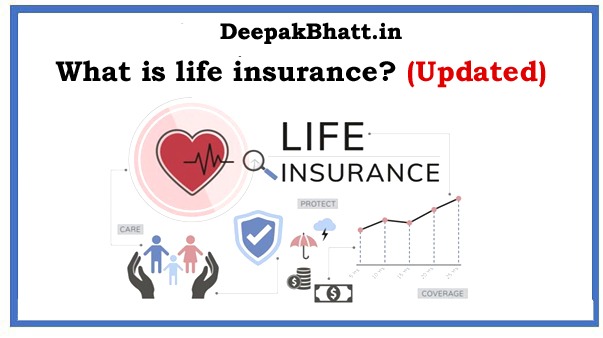What is life insurance: Life insurance is intended to console you that your dependents, for example…
your youngsters or an accomplice, will be monetarily cared for in case of your passing.
There are a few things to contemplate while getting it, for example, the kind of arrangement you need, when you want it, and how to get it. What is Insurance?
- 1 What is life insurance?
- 1.1 What sorts of extra security are there?
- 1.2 There are two fundamental sorts:
- 1.3 There are three sorts of term life arrangements.
- 1.4 Whose life would you say you are insurance?
- 1.5 Do you want disaster protection?
- 1.6 You don’t Require it if:
- 1.7 How much is extra security?
- 1.8 Regularly scheduled installments will rely upon things, for example,
- 1.9 Any obligations
- 1.10 Five things to contemplate while purchasing extra security
- 1.11 1. Speak the truth about your clinical history
- 1.12 2. Peruse the important part
- 1.13 3. You can adjust your perspective
- 1.14 4. Could you at any point change to a more ideal arrangement?
- 1.15 5. Think about a waiver
What is life insurance?
Disaster protection pays out either a singular amount or standard installments on your demise, giving your dependants monetary help after you’ve gone.
How much cash is paid out relies upon the degree of cover you purchase.
You conclude how it’s paid out and whether it will cover explicit installments – like a home loan or lease – or then again assume it’s to leave your family with a legacy.
What sorts of extra security are there?
There are two fundamental sorts:
Term disaster protection approaches
These run for a proper timeframe, known as the ‘term’ of your approach, like five, ten, or 25 years. They possibly payout assuming that you kick the bucket during the strategy.
There are three sorts of term life arrangements.
Level – pays as a single amount assuming you pass on inside the concurred term. The degree of cover remains something very similar all through. This is the most straightforward and reasonable choice.
Diminishing – the degree of cover decreases every year. It’s intended to be utilized with reimbursement contracts, where the exceptional credit diminishes over the long haul.
Expanding – the degree of cover ascends over the term of the strategy, to stay aware of expansion.
Entire extra security arrangements
This compensation is out regardless of when you kick the bucket, as long as you stay aware of your exceptional installments.
They’re much of the time used to help towards a memorial service or for Inheritance Tax arranging.
Notwithstanding, they’re normally more costly than more limited-term strategies. There’s additionally a likelihood that assuming you live longer than you expected, you could wind up paying more in than you’ll get out.
Whose life would you say you are insurance?
You can pick a joint strategy or a solitary one.
Assuming that you take out joint disaster protection, the cash will go to the enduring policyholder – like your mate. This is except if you made elective courses of action.
Assuming you take out single disaster protection, the cash goes into your home. So you want to conclude who it goes to when you pass on.
A joint life strategy is normally more reasonable than two separate single arrangements. Nonetheless, joint life cover just pays out on the main demise. Though purchasing two single strategies would ensure there’s compensation out on every passing.
Do you want disaster protection?
Disaster protection pays out when you bite the dust – not when you lose pay because of ailment or inability.
- It’s reasonable for you on the off chance that you have:
- dependants, for example, young kids
- an accomplice who depends on your pay, or
- a family residing in a house with a home loan that you pay – an extra security strategy can accommodate them assuming you pass on.
- You could likewise need an arrangement that covers your memorial service costs.
You don’t Require it if:
you’re single
your accomplice procures enough for your family to live on
you’re on low pay and could meet all requirements for State benefits.
Check to assume that you as of now have it through your work. Representative bundles frequently remember ‘passing for administration advantages’ that will give a measure of cover that is connected to your compensation.
Contingent upon the amount it’s worth, you probably won’t require an added extra security strategy. However, recollect that assuming you quit working for that business, you’ll as of now not be covered under their strategy.
You could likewise have to ponder whether getting a payout will influence any means-tried benefits your dependants could somehow fit the bill for.
How much is extra security?
The expense changes are contingent upon various variables. In any case, extra security is by and large viewed as great worth.
A strategy giving your friends and family a fair measure of monetary assurance can cost from only a couple of pence a day.
Regularly scheduled installments will rely upon things, for example,
- Age
- Wellbeing
- your way of life
- whether you smoke
- your family clinical history
- the length of the arrangement
- your occupation – a high-risk occupation could push your charges up.
- The cost is additionally impacted by the degree of cover you purchase. How much cover you want will rely upon:
Any obligations
- contract/lease
- number of wards
- salary or pay from different sources.
Five things to contemplate while purchasing extra security
1. Speak the truth about your clinical history
Most cases are effective, yet it’s essential to give your safety net provider all the data they request. At the point when you make a case, they will actually take a look at your clinical history. In the event that you didn’t answer honestly or precisely in your application, or didn’t uncover something, they probably won’t payout.
2. Peruse the important part
Ensure you know precisely what the exact thing that is and isn’t covered is. Know that definitions and rejections (what isn’t covered) can fluctuate between various backup plans. On the off chance that you see something you don’t have any idea about, ask the protection supplier, or your protection dealer or monetary consultant.
3. You can adjust your perspective
You have 30 days from purchasing the arrangement to adjust your perspective and return the money in question.
4. Could you at any point change to a more ideal arrangement?
On the off chance that you’re youthful or potentially sound, it very well may merit checking whether you can a more ideal arrangement somewhere else.
However, as you progress in years or foster clinical issues, you could find it’s less expensive to stay with an arrangement you purchased when you were more youthful.
On the off chance that you choose to switch, ensure you don’t drop your current strategy until the substitution strategy is completely set up and you have made the principal regularly scheduled installment.
At the point when you’ve dropped an arrangement, you can’t adjust your perspective.
5. Think about a waiver
With some insurance contracts, you can request additional elements to be incorporated. For instance, in the event that you pay a piece extra to add a ‘waiver of premium’ to your arrangement – your expenses will be paid naturally on the off chance that you can never again work because of a mishap or sickness.
This is to safeguard against your approach being dropped assuming you miss a regularly scheduled installment.











